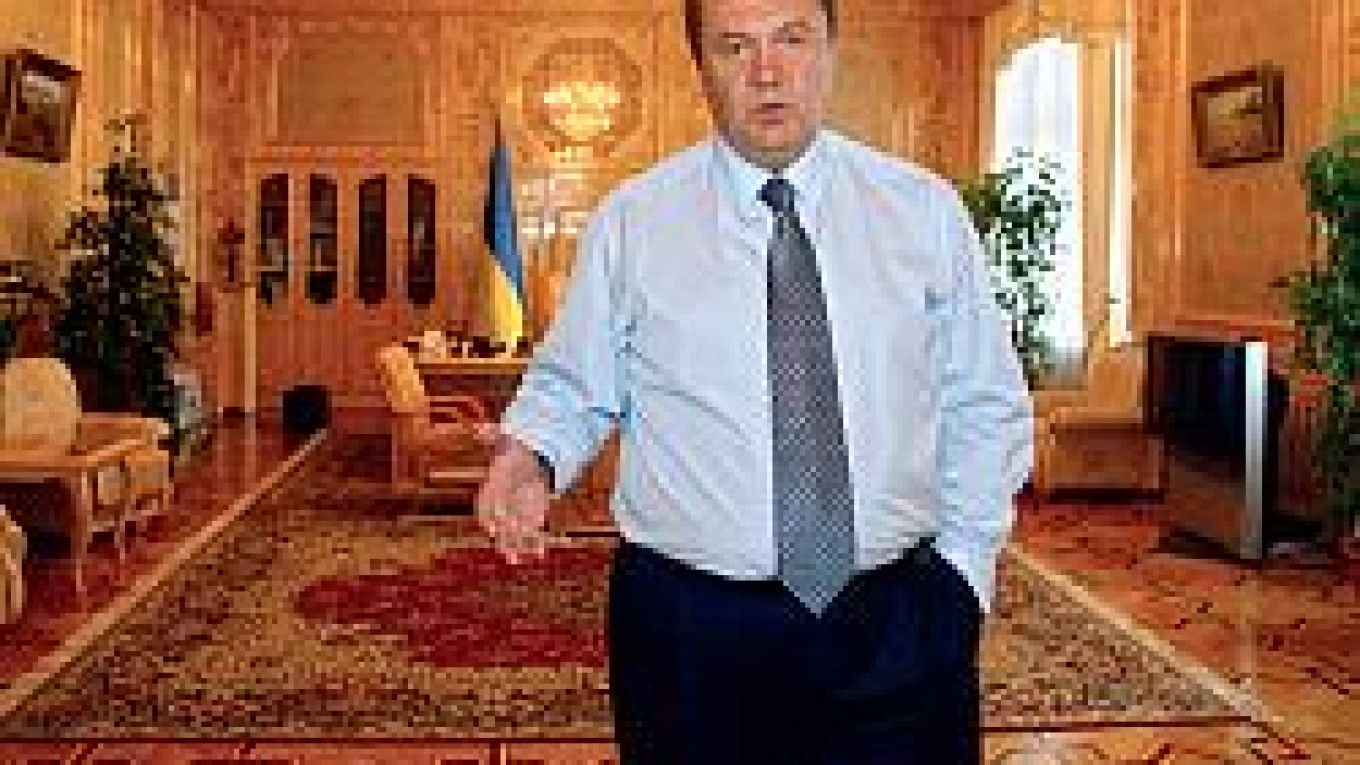"Ukraine is a Klondike, an El Dorado," said Andrei Ryabov, a specialist on domestic politics at the Carnegie Moscow Center. With Russia's election cycle over, "business is drying up at home. Politics have already become a different kind of game."
Campaign masterminds often shun the spotlight, but not always. For example, Gleb Pavlovsky, a Kremlin insider and spin doctor, announced plans this week to launch a "Russian Club" in Kiev.
Pavlovsky's club is technically a non-governmental forum to discuss bilateral relations, but it is one of the many channels through which Moscow can influence the outcome of Ukraine's Oct. 31 presidential election.
The launch was meant to take place Tuesday but was postponed after the coal mine blast in southeast Ukraine, Pavlovsky said by telephone, having returned to Moscow. (See Story, Page 3.)
Stanislav Belkovsky, of the siloviki-connected National Strategy Council, and Marat Gelman, formerly a political coordinator for Channel One state television, are also reported to be offering their services in Kiev.
Besides these two, all the top political consulting firms have sent representatives to Kiev, many of whom have big names and successful records. But at best, they will play supporting roles to Ukraine's own campaign managers, Ryabov said.
"It's a star shower," Ukrainian commentator Oleg Medvedev told Profil magazine, but "supply ... is clearly higher than demand."
People like Pavlovsky and Gelman will have the limited task of influencing the segment of the population that is sympathetic to Russia, predominantly located in eastern Ukraine. They can also work back channels with the Kremlin and play go-between with business groups that have serious interests in Ukraine.
Much can change in three months, but for now, Kremlin resources seem to be engaged on behalf of Prime Minister Viktor Yanukovich, seen as the heir apparent to President Leonid Kuchma.
Kuchma has said he will not run for a third term as president, even though under constitutional loopholes, it is possible.
Out of Yanukovich's nine rivals, polls consistently give only one -- "Our Ukraine" party leader Viktor Yushchenko, who was prime minister until April 2001 -- a chance to beat him.
Moscow prefers Yanukovich partly "because he has a better chance of uniting voters," Pavlovsky said, while Yushchenko is "personally pleasant, but not a reliable negotiating partner."
Most polls put Yushchenko ahead of Yanukovich by about a 10 percent margin, while more than a third of the electorate remains undecided.
Viktor Chernomyrdin, Russia's influential ambassador to Ukraine, spoke out in favor of Yanukovich in an interview earlier this month with the weekly Korrespondent, saying Yanukovich's election would help maintain good bilateral relations. He also hinted that Russia dislikes that Yushchenko is looking more to the West for allies than to Russia.
"Why do we work with those in power?" Pavlovsky said in Kiev on Monday, the Glavred news agency reported. "Because in the post-Soviet space, political oppositions stand apart from power," while those in office have more real-world experience, he said.
Ryabov noted that Ukraine's business elite, in contrast to Russia's, feels the freedom to back Yushchenko, even if he is the opposition candidate. And Russian businessmen may also back Yushchenko if they feel he can better guarantee their interests, even if the Kremlin is backing Yanukovich.
In Kiev on Monday, Pavlovsky found himself on the receiving end of pointed questions from Ukrainian journalists, unhappy with what some see as interference, Rossia state television reported.
"Our position on Ukraine is very simple," he responded, according to a Rossia transcript. "We want a strong, sovereign Ukraine because we want to decide the fate of Eastern Europe together with strong, sovereign states in this space."
A Message from The Moscow Times:
Dear readers,
We are facing unprecedented challenges. Russia's Prosecutor General's Office has designated The Moscow Times as an "undesirable" organization, criminalizing our work and putting our staff at risk of prosecution. This follows our earlier unjust labeling as a "foreign agent."
These actions are direct attempts to silence independent journalism in Russia. The authorities claim our work "discredits the decisions of the Russian leadership." We see things differently: we strive to provide accurate, unbiased reporting on Russia.
We, the journalists of The Moscow Times, refuse to be silenced. But to continue our work, we need your help.
Your support, no matter how small, makes a world of difference. If you can, please support us monthly starting from just $2. It's quick to set up, and every contribution makes a significant impact.
By supporting The Moscow Times, you're defending open, independent journalism in the face of repression. Thank you for standing with us.
Remind me later.


